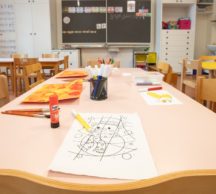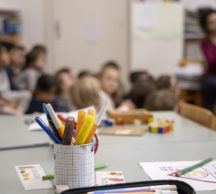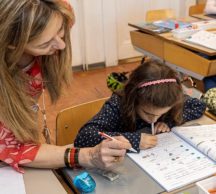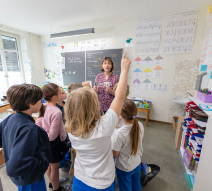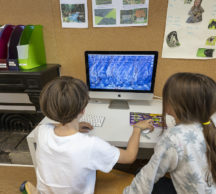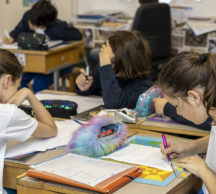Sixth-year primary class
The program in detail
- Reading and understanding literature
- Writing
- Spelling
- Diction and memorising
- Conjugation
- Grammar
- Vocabulary
- Geography
- History
- Mathematics - Numbers
- Space
- English
- German
- Science
- Arts
- Sports
- Bible studies
Reading and understanding literature
- Reading aloud, with explanations of difficult words and the meaning of texts
- Silent reading with questions to make sure a text has been understood correctly
- Supervised reading (novels, tales, etc.)
- Book presentations given by pupils
Writing
- Reading aloud, with explanations of difficult words and the meaning of texts
- Silent reading with questions to make sure a text has been understood correctly
- Supervised reading (novels, tales, etc.)
- Book presentations given by pupils
Spelling
- Weekly dictation
- Collective and individual writing
- Spelling exercises
Diction and memorising
- Memorising and reciting poems
Conjugation
- Revising the verbs ‘to be’ (être), ‘to have’ (avoir) and ‘to sing’ (chanter)
- Studying new verbs in the four known tenses (present, imperfect, future, present perfect)
- Introducing the preterite and the present imperative
- Affirmative, negative and interrogative forms
Grammar
Recognising the nature of words
- Nouns and noun groups
- Determiners: article determiners, possessive determiners, demonstrative determiners
- Adjectives
- Verbs
- Personal pronouns
- Prepositions and prepositional groups
Recognising how words or word groups work
- Subject groups
- Verb groups including non-prepositional and prepositional verb complements
- Sentence complements
Vocabulary
- Spelling day-to-day words
- Widening semantic vocabulary
- Using a dictionary
- Synonyms, homonyms and antonyms
Geography
- Identifying relations between human activities and how space is organised
- My canton: a place for travelling and enjoying leisure activities
History
- Identifying how humankind has organised its collective life through the ages
- Period of history: Antiquity
Mathematics - Numbers
- Numbers from 0 to 1,000,000: dictating, categorising, comparing, etc.
- Operations (additions, subtractions, multiplications and divisions): mental calculations, operation techniques, problem-solving, using a calculator, etc.
Space
- Plane and solid geometric figures, finding locations on a plane and in space, etc.
- Sizes and measurements: units of measurement, length, mass, area, etc.
- Problem-solving for learning how to reason, for understanding a number and giving it value, for using the four operations’ properties, for exploring and organising space, for understanding geometric figures and transformations on a plane, and for measuring
Two weekly workshops in mathematical reasoning with help from a student from the EPFL school of technology in Lausanne.
English
- Level 3 of the ‘Kid’s Box’ method. First year of preparing for the Cambridge ‘Young Learners Movers Test’ examination
- Special lessons for English-speaking pupils using Level 3 of the ‘Nelson English’ method (developing fiction/non-fiction skills , grammar and spelling)
Lessons are given in half-groups by a specialist teacher who is a native English-speaker.
German
- Continued learning using the method ‘Der Grüne Max – Deutsch für die Romandie – 6. Klasse’
- Learning the basic rules of grammar and spelling, widening vocabulary
- Topics covered: school, family and friends, pets, and an annual topic chosen by the school
Lessons are given in half-groups by a specialist teacher who is a native German-speaker
Science
- Natural and technical phenomena
- Diversity of the living world
- Human body
- Annual topic chosen by the school
Arts
- Cultivating an appreciation of artistic activities, stimulating pupils’ creativity and imagination
- Trying out a wide range of techniques: drawing, painting, collage, cutting up, putting together, printing techniques, modelling, etc.
- Using a wide range of materials: paper, cardboard, soil, fabrics, plaster, natural material, etc.
- Introducing art: studying culture by associating names, works of artists, styles and readings
- Making objects and gifts for different events (Christmas, Mother’s Day, etc.)
Artistic activities are taught for half of the year in French and the other half of the year in English by a native English-speaker so that pupils can put into practice points learned in lessons in a less formal setting
Sports
- Individual and collective games (techniques and tactics)
- Sporting exercises: motor-skills activities, running, jumping, throwing, etc.
- Health and physical condition: warming up, getting muscles ready
- Interpersonal skills: teamwork, pleasure, bravery, sportsmanship, respect for opponents, etc.
Bible studies
- The story of a people: from Moses to the prophets
Toutes les informations pour procéder aux démarches d’admission sont disponibles en ligne :
Admissions